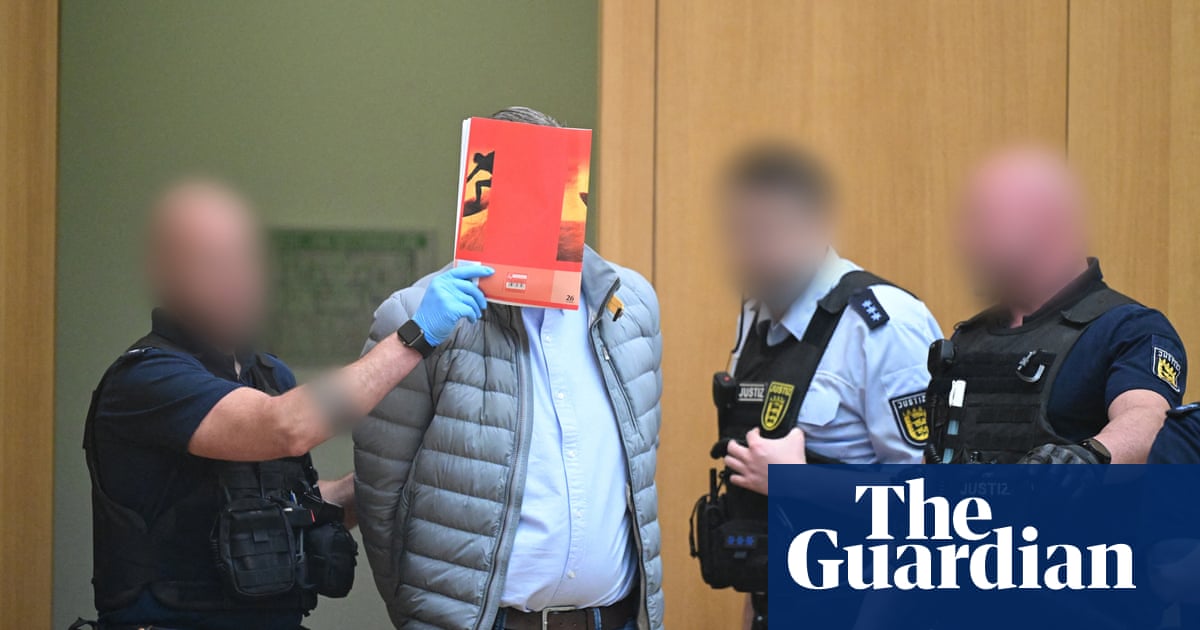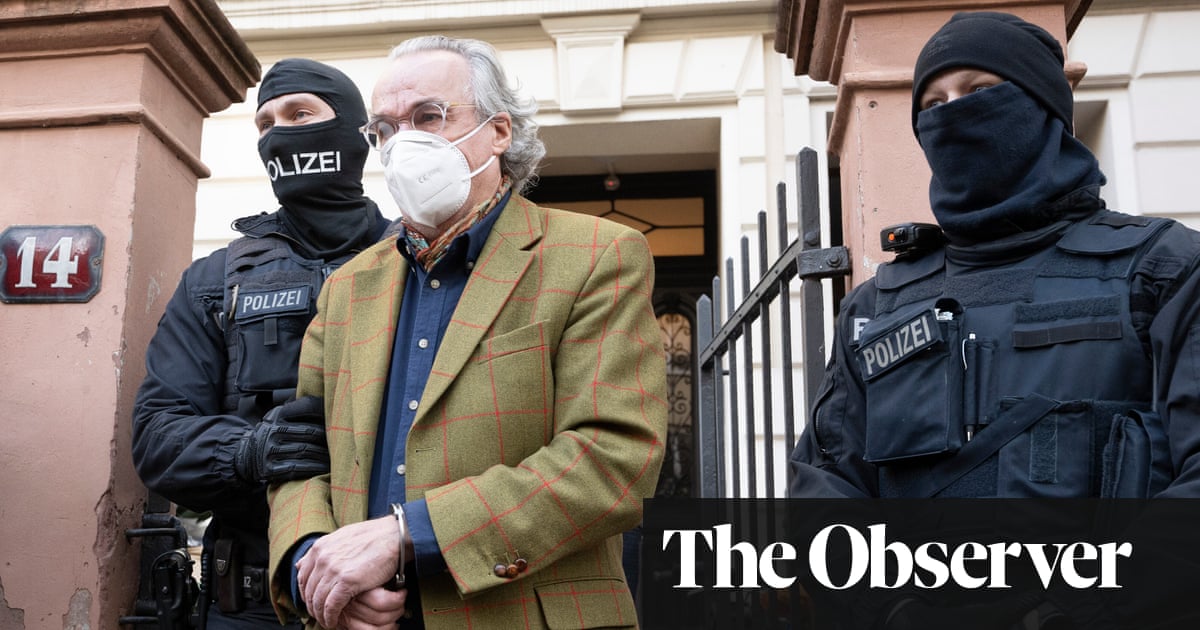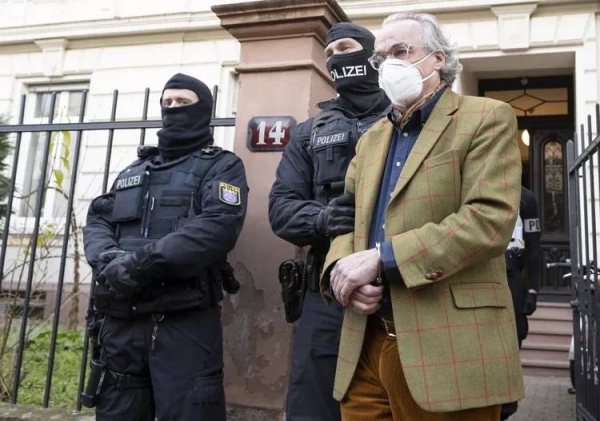
Nine people have gone on trial amid tight security in the southern German city of Stuttgart in one of three cases linked to an alleged far-right plot to overthrow the state led by a pseudo-aristocrat businessman.
The men are charged with high treason, attempted murder, and membership of a terrorist organisation in relation to the alleged coup, which was foiled in nationwide raids in 2022. They are identified as belonging to the “military wing” behind the group’s ringleader, the 72-year-old self-styled aristocrat Heinrich XIII, Prince Reuss.
The Stuttgart trial is the first of three separate court proceedings – split up over time and space for security and logistical reasons – in what amounts to the biggest legal case of its kind in postwar Germany. Twenty-six people are due to appear in the dock. Federal prosecutors in December initially filed terrorism charges against 27 people, one of whom has since died.
Tight, airport-style security controls held up the planned start of Monday’s trial by more than an hour. The first day was largely taken up by the reading of the 33-page indictment.
The men, aged between 42 and 60, include a metalworker, a coronavirus denier and YouTuber, a kitchen salesman who had formerly served as a reservist in Afghanistan, an IT expert, a former soldier turned agricultural machinery mechanic and a roofer. They appeared in court in handcuffs. All of them were dressed casually, in puffer jackets, jeans, open, untucked shirts and cargo trousers.
Some of them were seen to smirk and snigger as the indictment was read out, waving and smiling at people in the public gallery. All of faces of the men were concealed by books and files held up by police officers when cameras, as is typical for a German court, were briefly allowed to capture the minutes before the start of the proceedings.
A defence petition for all three trials to be held at the same time and place was rejected by judge Joachim Holzhausen as unworkable. The lawyers had argued that a fair trial would not possible if evidence that connected the three court cases – referenced as trials pertaining to the military wing, the political wing and the esoteric wing of the group – was not shared between the courts.
Two of the men said through their lawyers that they planned to respond to the accusations. Another said he would acknowledge questions relating to his person, but not to the charges he faced. The remaining six said they would reserve their right not to say anything throughout the trial.
In Stuttgart alone, 300 witnesses are due to be called, including 270 police officers and several experts, over a period of 48 court dates.
Those on trial on Monday include former and existing members of the armed services, including the elite force, as well as a police officer. One of them, identified in the court documents as Markus L, is accused by prosecutors of shooting at two police officers who stormed his house to arrest him.
If convicted, the men can expect sentences of between one and 10 years and, in the case of Markus L, up to life imprisonment.
Prosecutors said the accused had stored up to €500,000 (£428,000) in cash, along with 380 guns, 350 bladed weapons and just under 150,000 rounds of ammunition, which they referred to among themselves by the codename “bonbons”.
Speaking before the trial, Andreas Singer, the president of the Stuttgart court, told journalists: “We’re not just talking about a group of nice avuncular figures who had a few strange ideas.”
The group had begun setting up a nationwide system of 286 militarily organised groups, referred to as “homeland security companies”, which were due to come into action on “Day X”, the day on which the coup was to take place, starting with a power cut to create chaos, followed by a storming of the parliament building in Berlin, in which government figures were to be taken hostage, with the use of violence encouraged.
Reuss, an antisemitic businessman descended from a formerly aristocratic family, founded the group with the express wish to violently eliminate the state order. He is due to go on trial in Frankfurt along with eight others, seen as the main figureheads behind the plot, on 21 May. A third trial will take place in June in Munich.
Names on the group’s hitlist allegedly included Chancellor Olaf Scholz, the leader of the conservative opposition, Friedrich Merz, and two leading television personalities.
The maximum security courtroom in Stuttgart – built inside Stammheim prison to hold the trials of the far-left Red Army Faction members in the 1970s – has been fitted with 2-metre-high bulletproof glass to protect the public, and judges and prosecutors.
Ahead of the trial, authorities said they had been tracking support for the accused men, including among people in the Querdenker anti-Covid restrictions movement, who posted messages on social media saying they would “hold a vigil” for those on trial and were “planning to get them released”.
The trials are expected to throw light on the Reichsbürger (Citizens of the Empire) movement, which rejects the legitimacy of modern Germany. According to constitutional experts, there are about 23,000 Reichsbürger members in Germany, about 10% of whom are said to be ready to use violence.
Prosecutors say the alleged coup plotters believed that the Federal Republic of Germany was a partnership being run by the deep state and that, by carrying out the coup, they would be freeing people from its grip. They also believed in the US-based QAnon conspiracy theory, according to prosecutors.
The trials are scheduled to go on until at least the start of 2025.
At the weekend the interior minister, Nancy Faeser, told German media that the state would “come down hard” against extremist structures. She said: “These military Reichsbürger are driven by hatred towards our democracy.
“We will continue to take a tough course … until we have completely exposed the Reichsbürger structures and destroyed them … No one in the extremist scene should feel safe.”
Prosecutors said that their investigations into the group may go well beyond the three scheduled trials involving the 27 defendants, owing to the fact that the identities of at least 136 further people who signed up to the group is known. They and others connected to them may well yet face prosecution.












